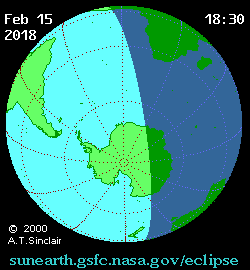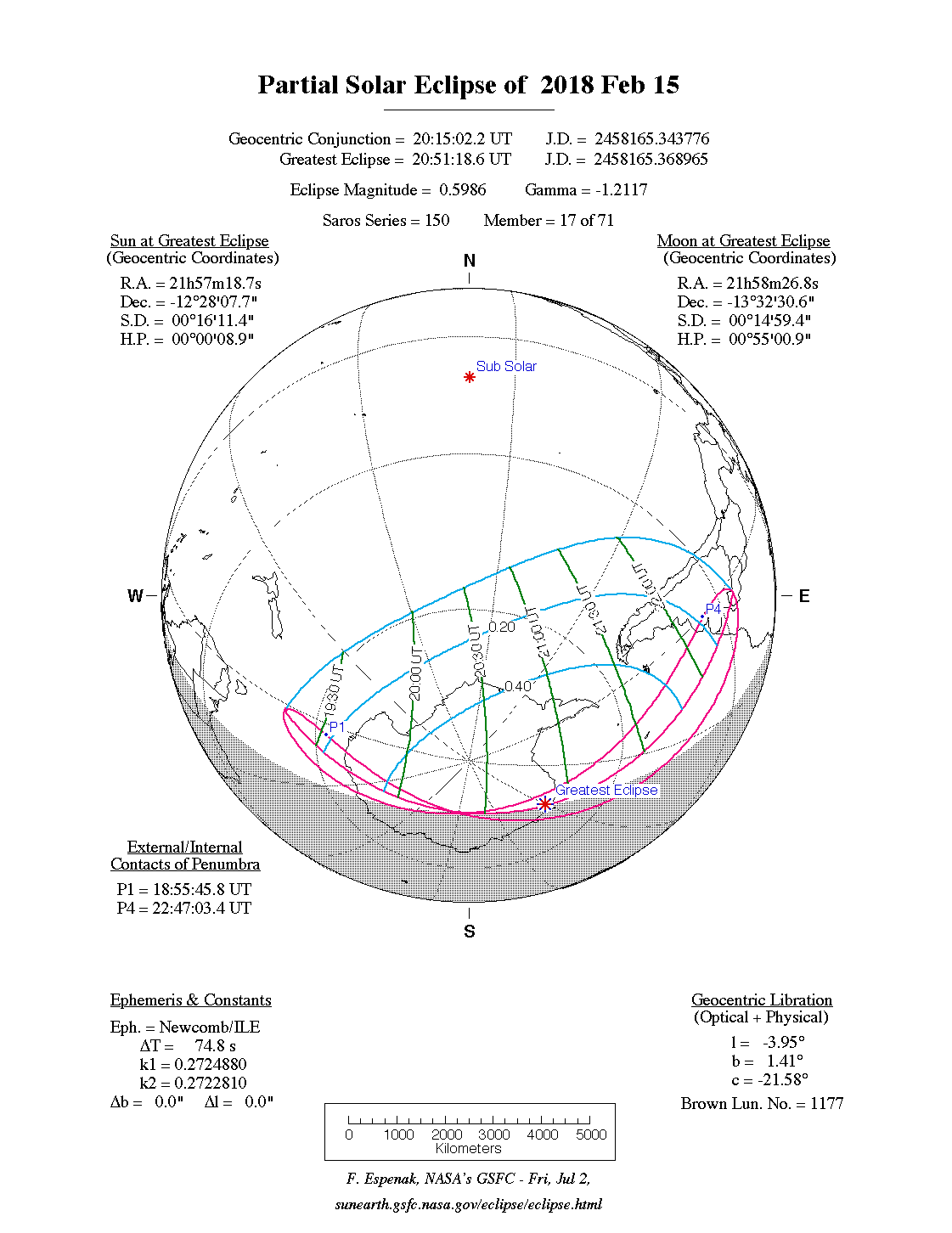Partial solar eclipse on February 16 2018 (Antarctica)

The Moon information shown here applies to Vostok, Antarctica on Friday, February 16, 2018. (Local time Antarctica/Vostok)
| Moonrise to moonset | 20h26m |
| Moonrise | 01:47 |
| Moonset | 22:13 |
| Distance to the center of the Sun | 147,792,290 km |
| Distance to the center of Earth | 398,935 km |
| Moon ilumination (at midnight) | 0% |
| Lunar phase | new moon |
| Current zodiac sign the Moon | Aries ♈ |
| Moon age (days past new moon) | 29.4 |
According to international time UTC, a solar eclipse will occur on February 16, 2018 which will be visible in some parts of the world. The following shows the cities in Antarctica from which the eclipse could be visible (note that the following is a short list of some of the main cities, the eclipse may be visible from other cities not listed here). The date and local time of the event shown below.
| City | Eclipse visible? | Phase |
|---|---|---|
| Vostok | Yes | Partial |
| Aboa Station | Yes | Partial |
| Amundsen–Scott South Pole Station | Yes | Partial |
| Capitán Arturo Prat Station | Yes | Partial |
| Casey Station | No | - |
| Concordia Research Station | Yes | Partial |
| Davis Station | No | - |
| Doctor Sobral | Yes | Partial |
| Elephant Island | Yes | Partial |
| Escudero Station | Yes | Partial |
| General Belgrano Station | Yes | Partial |
| General Bernado O’Higgins Station | Yes | Partial |
| Great Wall Station | Yes | Partial |
| Halley Research Station | Yes | Partial |
| Maitri Station | Yes | Partial |
| Mawson Station | No | - |
| Mirny Station | No | - |
| Neumayer–Station III | Yes | Partial |
| Orcadas Station | Yes | Partial |
| Palmer Station | Yes | Partial |
| Peter I Island | No | - |
| San Martín Station | Yes | Partial |
| Scott Base | Yes | Partial |
| Signy Island | Yes | Partial |
| Svea Station | Yes | Partial |
| Teniente Jubany Station | Yes | Partial |
| Tor Station | Yes | Partial |
| Troll Station | Yes | Partial |
| Wasa Station | Yes | Partial |
| Zhongshan Station | No | - |
Information about this eclipse

Information of the Greatest Eclipse

This image shows the moments of external and internal contacts with the Moon's penumbra (and Moon's umbra when applicable) as well as the horizon and geocentric coordinates of the Sun and the Moon as well as the place and moment of the greatest eclipse. Some of the information from the image has been condensed in the following table. Please regard that the information in the following table applies only to the place of maximum eclipse, latitude 71.0S and longitude 0.6E, on 2018-02-15 at 20:52:33 (UT).
| Date (UT) | 2018-02-15 |
| Time (UT) | 20:52:33 |
| Latitude | 71.0S |
| Longitude | 0.6E |
| Gamma | -1.2116 |
| Magnitude | 0.5991 |
| Saros | 150 |
| Sun alt. | 0 |
| Sun azi. | 228 |
| Path width | |
| Central Dur. |
Eclipse schedule in Antarctica
The following table shows the schedule and phases of the partial solar eclipse of February 16, 2018 in Antarctica. For each city we have assigned a time zone which is very precise and it takes into account Daylight Saving Time (if applicable).
Sun Alt.: Excellent Good Low Too low
| City | Details | ||||||||||||||||
|---|---|---|---|---|---|---|---|---|---|---|---|---|---|---|---|---|---|
| Event date | Partial eclipse starts | Sun Alt. | Total eclipse starts | Max. eclipse | Sun Alt. | Azimuth | Total eclipse ends | Ends partial eclipse | Sun Alt. | Mag. | Obs. | ||||||
| Vostok (UTC 6) | 2018-02-16 | 01:13:09 | 3 | - | 02:05:51 | 4 | 136 | - | 02:59:22 | 6 | 0.465 | 34.5% | |||||
| Aboa Station (UTC 6) | 2018-02-16 | 01:51:55 | 9 | - | 02:50:01 | 6 | 242 | - | 03:46:39 | 3 | 0.591 | 48.1% | |||||
| Amundsen–Scott South Pole Station (UTC 6) | 2018-02-16 | 01:24:58 | 12 | - | 02:23:08 | 12 | 098 | - | 03:21:16 | 12 | 0.507 | 38.9% | |||||
| Capitán Arturo Prat Station (UTC 6) | 2018-02-16 | 02:19:20 | 24 | - | 03:20:00 | 17 | 276 | - | 04:17:17 | 11 | 0.477 | 35.8% | |||||
| Concordia Research Station (UTC 6) | 2018-02-16 | 01:05:54 | 2 | - | 01:56:00 | 4 | 122 | - | 02:47:16 | 7 | 0.4 | 27.8% | |||||
| Doctor Sobral (UTC 6) | 2018-02-16 | 01:41:26 | 15 | - | 02:41:36 | 13 | 272 | - | 03:40:37 | 11 | 0.549 | 43.6% | |||||
| Elephant Island (UTC 6) | 2018-02-16 | 02:20:51 | 23 | - | 03:21:13 | 16 | 274 | - | 04:18:12 | 10 | 0.48 | 36.1% | |||||
| Escudero Station (UTC 6) | 2018-02-16 | 02:20:12 | 24 | - | 03:20:42 | 17 | 275 | - | 04:17:50 | 10 | 0.478 | 35.9% | |||||
| General Belgrano Station (UTC 6) | 2018-02-16 | 01:47:57 | 15 | - | 02:48:00 | 11 | 264 | - | 03:46:31 | 8 | 0.565 | 45.3% | |||||
| General Bernado O’Higgins Station (UTC 6) | 2018-02-16 | 02:17:44 | 23 | - | 03:18:27 | 16 | 275 | - | 04:15:53 | 10 | 0.488 | 37% | |||||
| Great Wall Station (UTC 6) | 2018-02-16 | 02:20:09 | 24 | - | 03:20:40 | 17 | 275 | - | 04:17:49 | 10 | 0.478 | 35.9% | |||||
| Halley Research Station (UTC 6) | 2018-02-16 | 01:52:22 | 13 | - | 02:51:41 | 9 | 254 | - | 03:49:22 | 6 | 0.579 | 46.8% | |||||
| Maitri Station (UTC 6) | 2018-02-16 | 01:52:19 | 1 | - | 02:09(s) | 0(s) | 228 | - | 02:09(s) | 0(s) | 0.246(s) | 13.8% | |||||
| Neumayer–Station III (UTC 6) | 2018-02-16 | 01:58:57 | 6 | - | 02:55:35 | 2 | 236 | - | 03:27(s) | 0(s) | 0.597 | 48.9% | |||||
| Orcadas Station (UTC 6) | 2018-02-16 | 02:24:54 | 17 | - | 03:23:21 | 10 | 262 | - | 04:18:39 | 3 | 0.516 | 39.9% | |||||
| Palmer Station (UTC 6) | 2018-02-16 | 02:12:58 | 25 | - | 03:14:30 | 19 | 282 | - | 04:12:49 | 13 | 0.474 | 35.4% | |||||
| San Martín Station (UTC 6) | 2018-02-16 | 02:04:27 | 26 | - | 03:06:39 | 20 | 288 | - | 04:06:00 | 15 | 0.48 | 36.1% | |||||
| Scott Base (UTC 6) | 2018-02-16 | 01:07:20 | 12 | - | 02:00:15 | 15 | 080 | - | 02:54:24 | 18 | 0.366 | 24.6% | |||||
| Signy Island (UTC 6) | 2018-02-16 | 02:24:57 | 17 | - | 03:23:30 | 10 | 262 | - | 04:18:53 | 3 | 0.513 | 39.6% | |||||
| Svea Station (UTC 6) | 2018-02-16 | 01:52:25 | 9 | - | 02:50:14 | 5 | 240 | - | 03:46:36 | 2 | 0.593 | 48.4% | |||||
| Teniente Jubany Station (UTC 6) | 2018-02-16 | 02:20:10 | 23 | - | 03:20:40 | 17 | 275 | - | 04:17:47 | 10 | 0.479 | 36% | |||||
| Tor Station (UTC 6) | 2018-02-16 | 01:52:56 | 3 | - | 02:48:33 | 0 | 225 | - | 02:48(s) | 0(s) | 0.599 | 49% | |||||
| Troll Station (UTC 6) | 2018-02-16 | 01:53:33 | 4 | - | 02:49:27 | 0 | 227 | - | 03:01(s) | 0(s) | 0.599 | 49% | |||||
| Wasa Station (UTC 6) | 2018-02-16 | 01:55:40 | 8 | - | 02:53:23 | 5 | 241 | - | 03:49:32 | 1 | 0.594 | 48.5% | |||||
if present, (r) means the eclipse is in progress at sunrise, while (s) means the eclipse is in progress at sunset.
You can read the table above as follows: On February 16, 2018 in Vostok (UTC 6), an eclipse of type partial solar eclipse will start at 01:13:09, the maximum eclipse will occur at 02:05:51 when the Sun reaches an altitud of 4° and azymuth of 136°;this event will come to an end at 02:59:22 and will have a magnitud of 0.465 (the magnitude of an eclipse is the ratio of the apparent size of the Moon to the apparent size of the Sun during an eclipse) and an obscurity of 0.345 (the fraction of the Sun obscured).
We must take into account the altitude of the sun, for example, in Vostok, due to the low altitude of the Sun (4 degrees) this solar eclipse will not be very obvious.
Source: Eclipse Predictions by Fred Espenak and Chris O'Byrne (NASA's GSFC).
Protect your eyes
Observers must be very careful while viewing the solar eclipse. Our advice is to never look at the Sun with the naked eye.For safety, you must always use sunglasses, telescopes and binoculars with special filters. Never use these equipments without protection as the Sun's ultraviolet and infrared light may harm your eyes or cause blindness if you look at the Sun directly.



